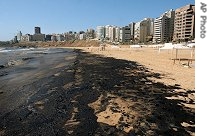2006年VOA标准英语-Lebanon Coastline Becomes Casualty of War
搜索关注在线英语听力室公众号:tingroom,领取免费英语资料大礼包。
(单词翻译)
By Margaret Besheer
Beirut
22 August 2006
More than a month of bombing and fighting in Lebanon between Hezbollah militants1 and Israel killed more than a thousand Lebanese and destroyed much of the nation's infrastructure2. The Mediterranean3 country's coastline is another casualty of the war.
---------
 Layer of crude oil covers Ramlet el-Beida public beach in Beirut, July 28, 2006 |
||
Lebanese officials and international experts estimate that the spill has damaged 150 kilometers of Lebanon's coast. The slick has been moving north, and there are reports of damage to Syria's coastline as well. But Lebanon's Ministry4 of Environment spokeswoman Ghada Mitri says a full assessment5 has not yet been possible.
"Israel has not given back control of our territorial6 waters, so we actually cannot go onsite in the sea to assess the situation there; we are forced to work with satellite imagery," she said.
The environmental group Greenpeace recently sent a diver into the sea near the Jiyyeh power plant, where the oil spill happened. Greenpeace documented a huge amount of oil that has sunk to the bottom of the sea, carpeting an area about 100 meters in length and dozens of meters wide.
Basma Badran, a Greenpeace spokeswoman, says sunken slicks are not very common in oil spills. She says this one is the result of having to wait for hostilities7 to cease before containment8 and clean up could begin.
"Usually in such kinds of spills you have 72 hours and you have it surrounded and monitored. This was not the case in the Lebanese situation, because under fire nobody could really react quickly," noted9 Badran.
Before the conflict, Lebanon's beaches were a major tourist attraction. But officials worry that the longer-term effects of the oil spill will deal a further blow the country's tourism industry, which provides Lebanon with about $2 billion a year in revenue.
The country's fishing industry has also been seriously hurt because the oil slick has poisoned fish and other sea creatures. Environmental experts are also concerned about the spills effect on the endangered sea turtle population, as the spill happened during breeding season. Greenpeace spokeswoman Basma Badran says the oil may have polluted some beaches where the turtles lay their eggs.
"That could cause the suffocation10 of the eggs, themselves, or even it would prevent the baby turtles either from going back to the sea which is already polluted, or just being killed immediately," she added.
The Ministry of Environment's Ghada Mitri says the cost of the clean up is expected to exceed $64 million and take at least a year.
"But that does not mean that within a year the Lebanese coast is going to be back to what it was," continued Mitri.
Mitri says some governments and international organizations have pledged funds, equipment and expertise11, but efforts are continuing to secure the millions of dollars needed to save Lebanon's coastline.
 收听单词发音
收听单词发音 




